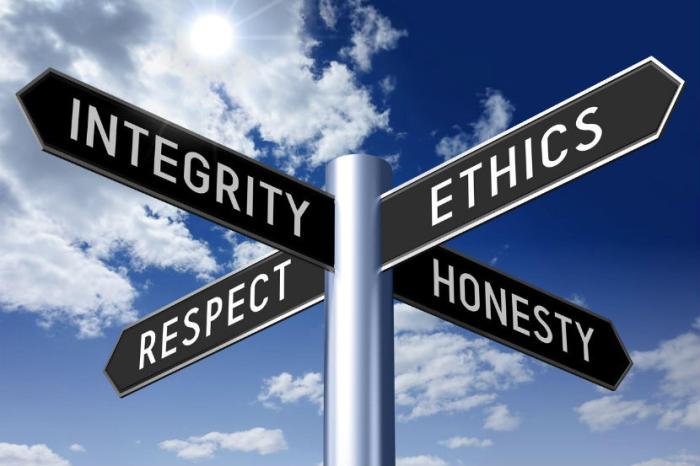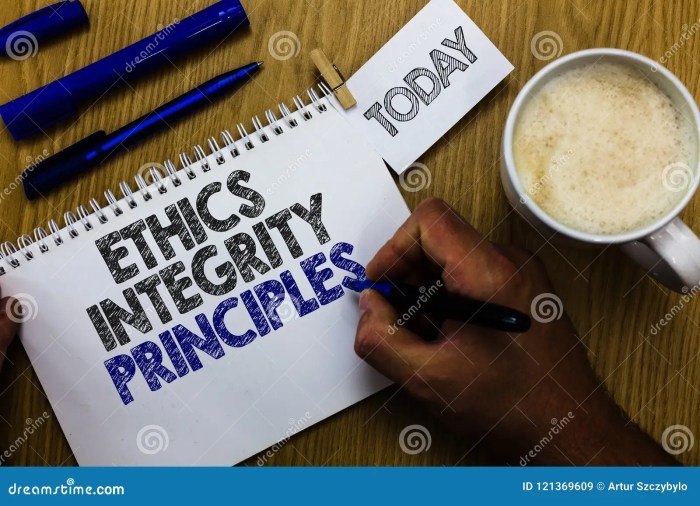Honesty integrity and morals are the cornerstone of public safety – Honesty, integrity, and morals are the cornerstone of public safety, forming the foundation for trust between the public and those sworn to protect and serve. Without these fundamental principles, the effectiveness and legitimacy of public safety agencies would be severely compromised.
This discourse will delve into the critical role of honesty, integrity, and morals in public safety, exploring their impact on daily operations, ethical dilemmas, and the building of a culture of ethical conduct. We will also examine the consequences of compromised morals and the importance of maintaining ethical standards in the face of societal pressures.
1. Cornerstones of Public Safety

The principles of honesty, integrity, and morals serve as the foundation of public safety. These principles guide the actions and decisions of public safety professionals, ensuring the protection and well-being of the communities they serve.
Explain the foundational principles of honesty, integrity, and morals in public safety.
Honesty in public safety involves being truthful and forthright in all interactions, both internally and externally. Integrity refers to adherence to ethical and moral principles, ensuring that actions are consistent with values and beliefs. Morals encompass the personal values and beliefs that guide individual behavior, shaping the decision-making process.
Provide examples of how these principles manifest in daily operations.
Honesty is demonstrated through accurate reporting, transparency in investigations, and open communication. Integrity guides decisions regarding the use of force, fair and impartial treatment of individuals, and adherence to legal and ethical standards. Morals influence interactions with the public, the treatment of victims and suspects, and the pursuit of justice.
Discuss the ethical dilemmas faced by public safety professionals.
Public safety professionals often face ethical dilemmas that require balancing competing values. Examples include the use of force, privacy concerns, and the duty to report misconduct. Navigating these dilemmas requires careful consideration of ethical principles and the potential consequences of different actions.
2. Importance of Honesty and Integrity

Honesty and integrity are crucial in public safety, fostering trust between the public and public safety agencies.
Share the consequences of dishonesty and integrity breaches in public safety.
Dishonesty and integrity breaches can erode public trust, undermine the legitimacy of public safety agencies, and jeopardize the safety of officers and the community. They can lead to misconduct, corruption, and a breakdown in the rule of law.
Explain how honesty and integrity foster trust between the public and public safety agencies.
Honesty and integrity build trust by demonstrating transparency, accountability, and a commitment to serving the community. When the public trusts public safety agencies, they are more likely to cooperate with investigations, report crimes, and feel safe in their neighborhoods.
Provide examples of how public safety agencies promote honesty and integrity.
Public safety agencies promote honesty and integrity through ethics training, codes of conduct, and internal oversight mechanisms. They encourage reporting of misconduct, provide whistleblower protection, and hold officers accountable for their actions.
3. Role of Morals in Public Safety
Morals influence decision-making in public safety, shaping the ethical choices made by officers.
Discuss the influence of morals on decision-making in public safety.
Morals guide officers in their interactions with the public, the use of force, and the pursuit of justice. They influence the treatment of victims, suspects, and witnesses, and shape the overall approach to policing.
Identify the ethical challenges faced by public safety professionals., Honesty integrity and morals are the cornerstone of public safety
Public safety professionals face ethical challenges that require balancing personal morals with professional responsibilities. These challenges include the use of force, privacy concerns, and the duty to report misconduct.
Explore the impact of personal morals on public safety practices.
Personal morals can influence public safety practices by shaping the way officers perceive and respond to situations. They can affect the use of discretion, the treatment of individuals, and the overall approach to policing.
4. Building a Culture of Honesty, Integrity, and Morals

Fostering a culture of honesty, integrity, and morals is essential in public safety.
Create a table outlining best practices for fostering a culture of honesty, integrity, and morals.
| Best Practice | Description |
|---|---|
| Ethics Training | Provide comprehensive training on ethical principles, decision-making, and the consequences of misconduct. |
| Codes of Conduct | Establish clear and enforceable codes of conduct that Artikel ethical expectations and standards of behavior. |
| Internal Oversight | Implement internal oversight mechanisms, such as internal affairs units, to investigate allegations of misconduct and hold officers accountable. |
| Whistleblower Protection | Provide protection and support for officers who report misconduct or unethical behavior. |
| Leadership | Promote ethical leadership and create a culture where honesty, integrity, and morals are valued and rewarded. |
Provide examples of training programs and initiatives that promote these principles.
Training programs and initiatives that promote honesty, integrity, and morals include ethics training, scenario-based exercises, and leadership development programs. These programs provide officers with the knowledge, skills, and values necessary to make ethical decisions and act with integrity.
Discuss the importance of leadership in shaping a culture of ethical conduct.
Leadership plays a critical role in shaping a culture of ethical conduct. Ethical leaders set high standards, provide guidance and support to officers, and hold them accountable for their actions. They create a work environment where honesty, integrity, and morals are valued and expected.
Answers to Common Questions: Honesty Integrity And Morals Are The Cornerstone Of Public Safety
What are the ethical dilemmas faced by public safety professionals?
Public safety professionals often face ethical dilemmas, such as balancing the need to enforce the law with compassion and understanding, respecting individual rights while ensuring public safety, and maintaining confidentiality while fulfilling their duties.
How can public safety agencies promote honesty and integrity?
Public safety agencies can promote honesty and integrity through training programs, codes of conduct, and leadership that emphasizes ethical behavior. They can also foster a culture of transparency and accountability, where individuals are encouraged to report any misconduct or ethical violations.